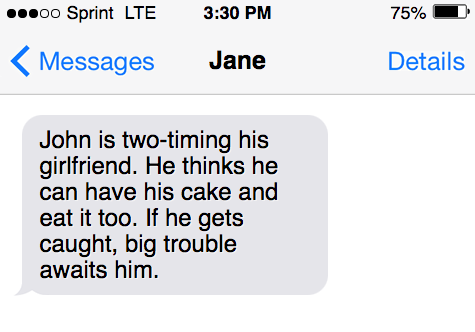What does “can’t have your cake and eat it too” mean? Why is this a common idiom in American English? And where did it originate?
Learn more in this simple grammar guide…
What does “have your cake and eat it too” mean?
Having your cake refers to keeping it with you. This means you want to preserve the cake for the future. But you also want to eat it. This is contradictory. The moment you eat your cake, you can’t have it because it is finished. Conversely, if you decide to have or keep your cake then you can’t eat it.
This proverb highlights a very valuable lesson which is that you cannot have it both ways. When you are presented with two choices that are mutually exclusive, you have to choose one. You cannot choose both. Either you have to eat the cake or have it. If we examine the wording, we find that ‘eat your cake and have it’ sounds more logical.
Both variants have been used in the past. But ‘have your cake and eat it too’ is more popularly used. This idiomatic proverb is quite popular and is used in many situations. It is used to refer to a context where a person wants to take two routes both of which lead to separate ways.

Origins of “have your cake and eat it too”
The first reference to this saying comes in a letter written by Thomas, the Duke of Norfolk to Thomas Cromwell in 1538. In this letter, the Duke says, “a man cannot have his cake and eat his cake.” This is the first time that this phrase was used. So, it would be correct to credit the good Duke with having invented this phrase.
In Jonathan Swift’s ‘Polite Conversation’ written in 1738, a character uses this phrase. “She cannot eat her cake and have it too.” As can be seen, the order of have and eat was reversed in this case.
The notorious Unabomber had in a letter to newspapers used ‘can’t eat your cake and have it too’. This order of eat-have was different. The FBI then found that the Unabomber whose real identity was Ted Kaczynski had used a similar phrase in a letter to his mother. So, this proverb helped apprehend a dangerous criminal.

Synonyms for “have your cake and eat it too”
Some phrases that have the same meaning as ‘have your cake and eat it too’ are:
- Have the best of both worlds.
- Have it both ways.
- Have all the cards.
- Have all the aces.
- Butter your bread both sides.
Antonyms for “have your cake and eat it too”
“You can’t have your cake and eat it too” is the antonym of this saying.
Examples of “have your cake and eat it too” in sentences
The following examples explain how you can use the phrase ‘have your cake and eat it too’ as a sentence:
- I wanted to have my cake and eat it too by working part-time in the evenings along with my regular job. Unfortunately, my boss found out and I lost my job.
- John is two-timing his girlfriend. He thinks he can have his cake and eat it too. If he gets caught, big trouble awaits him.
- On one hand voters want clean politicians. On the other hand, they are ready to accept their false promises. It is a classic case of wanting to have your cake and eat it too.
- You are not ready to work extra but are expecting a pay hike. Don’t think you can have your cake and eat it too.
- The teacher told Smith, “Listen boy, you can’t have your cake and eat it too. You cannot ignore your studies the whole year and then hope to get a good grade.”
Is the real saying, “you can’t have your cake and eat it too”?
‘You can’t have your cake and eat it too’ is the saying that has been popular for a very long time. The saying was first expressed in 1538. The present wording was first seen in 1812. There are two variants of this saying. One says ‘You can’t eat your cake and have it too’ while the other says ‘You can’t have your cake and eat it too’.
Both convey the same meaning, but the difference is in have-eat and eat-have. The present form of the saying became popular during the 1930s after which it became common.
Is the saying an idiom or a proverb?
The saying ‘you can’t have your cake and eat it too’ is both an idiom and a proverb. It is called an idiomatic proverb. A proverb is a popular saying that generally gives a message or advice. It conveys a meaning when all the words are put together. At the same time, it also has another meaning, which is implicit.
An idiom is a phrase that has a specific meaning that may not be related to the meaning of the individual words. Idioms can sometimes be difficult to understand. The particular saying above is a proverb but is idiomatic in nature.
Sources
- Have your cake and eat it too: Idiom meaning and examples
- You Can’t Have Your Cake And Eat It Too antonyms
- have your cake and eat it too synonyms with definition
- Have your cake and eat it too – Grammarist
- You can’t have your cake and eat it – Wikipedia
Inside this article
Fact checked:
Content is rigorously reviewed by a team of qualified and experienced fact checkers. Fact checkers review articles for factual accuracy, relevance, and timeliness. Learn more.
Core lessons
Glossary
- Abstract Noun
- Accusative Case
- Anecdote
- Antonym
- Active Sentence
- Adverb
- Adjective
- Allegory
- Alliteration
- Adjective Clause
- Adjective Phrase
- Ampersand
- Anastrophe
- Adverbial Clause
- Appositive Phrase
- Clause
- Compound Adjective
- Complex Sentence
- Compound Words
- Compound Predicate
- Common Noun
- Comparative Adjective
- Comparative and Superlative
- Compound Noun
- Compound Subject
- Compound Sentence
- Copular Verb
- Collective Noun
- Colloquialism
- Conciseness
- Consonance
- Conditional
- Concrete Noun
- Conjunction
- Conjugation
- Conditional Sentence
- Comma Splice
- Correlative Conjunction
- Coordinating Conjunction
- Coordinate Adjective
- Cumulative Adjective
- Dative Case
- Determiner
- Declarative Sentence
- Declarative Statement
- Direct Object Pronoun
- Direct Object
- Diction
- Diphthong
- Dangling Modifier
- Demonstrative Pronoun
- Demonstrative Adjective
- Direct Characterization
- Definite Article
- Doublespeak
- False Dilemma Fallacy
- Future Perfect Progressive
- Future Simple
- Future Perfect Continuous
- Future Perfect
- First Conditional
- Irregular Adjective
- Irregular Verb
- Imperative Sentence
- Indefinite Article
- Intransitive Verb
- Introductory Phrase
- Indefinite Pronoun
- Indirect Characterization
- Interrogative Sentence
- Intensive Pronoun
- Inanimate Object
- Indefinite Tense
- Infinitive Phrase
- Interjection
- Intensifier
- Infinitive
- Indicative Mood
- Participle
- Parallelism
- Prepositional Phrase
- Past Simple Tense
- Past Continuous Tense
- Past Perfect Tense
- Past Progressive Tense
- Present Simple Tense
- Present Perfect Tense
- Personal Pronoun
- Personification
- Persuasive Writing
- Parallel Structure
- Phrasal Verb
- Predicate Adjective
- Predicate Nominative
- Phonetic Language
- Plural Noun
- Punctuation
- Punctuation Marks
- Preposition
- Preposition of Place
- Parts of Speech
- Possessive Adjective
- Possessive Determiner
- Possessive Case
- Possessive Noun
- Proper Adjective
- Proper Noun
- Present Participle
- Prefix
- Predicate



